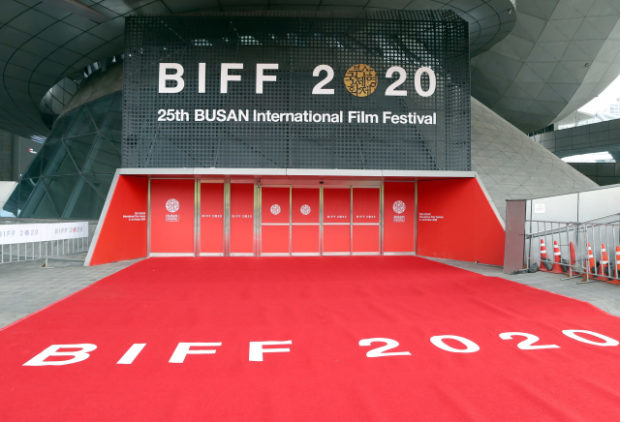Asia’s biggest film fest opens as a shadow of its usual self

Signs of the Busan International Film Festival are seen at an entrance of the Busan Cinema Center in Busan on October 21, 2020. Image: AFP/YONHAP
An anthology paying cinematic tribute to Hong Kong was the highlight Wednesday on the opening day of Asia’s biggest film festival, which has been forced largely online by the coronavirus pandemic.
The Busan International Film Festival (BIFF) usually sees a host of stars and industry players from Asia and elsewhere descend on the port city for 10 days of critical consideration and financial deal-making.
But strict conditions imposed this year due to the pandemic mean that while socially-distanced screenings are taking place, there are no opening or closing ceremonies, no red-carpet parades, no after-parties or outdoor fan events.
Even so the fact it is taking place at all contrasts with the many international festivals have gone online-only, while some — such as Cannes — have been canceled altogether.
This year marks BIFF’s 25th anniversary and comes after home-grown director Bong Joon-ho’s historic Oscar win for the dark comedy “Parasite” in February — the first time a foreign-language film has won top accolades in Hollywood.
Article continues after this advertisementAround 190 movies will be shown at this year’s festival and only once each, compared to the typical 300-odd films played multiple times — an 80% cut in total screenings.
Article continues after this advertisementViewers have to wear masks and only a quarter of theatre seats are being made available.
A trickle of moviegoers — outnumbered by staff — made their way into the Busan Cinema Center for the first shows on Wednesday, where hand sanitizers, QR codes and temperature screening were mandatory on the way in.
“It’s a shame that it’s been scaled down so much,” said Busan resident and festival regular Ahn Tae-jeong, 30. “I’m very down that I’m going to miss a lot of movies that I wanted to watch.”
The official opening film was the world premiere — one of 70 this year — of “Septet: The Story of Hong Kong,” a multi-director anthology that pays tribute to the territory from the 1950s to the present.
Directed by Tsui Hark, Ann Hui, Patrick Tam, Johnnie To, Yuen Wo Ping, Ringo Lam and Sammo Hung, the movie was shot on film to honor the golden age of Hong Kong cinema, from the 1960s to the 1990s.
The former British colony was once the regional cinematic powerhouse, producing as many as 200 Cantonese-language films a year that were devoured by cinema-goers across Asia and beyond.
“It was an era of ‘one hundred flowers blooming’ — the free expression of art — that nurtured numerous movie talents,” production company Media Asia Film Hong Kong said in a statement.
But since the 1997 handover to China, the city’s movie studios have gone into decline, eclipsed by flashier and wealthier rivals on the mainland and in South Korea.
‘Very special feeling’
Most BIFF components — including judging, press conferences, film and project markets and discussion forums — will still be held during the festival, but only online.
“It will certainly be a different festival this year,” Jason Bechervaise, a professor at Korea Soongsil Cyber University, told Agence France-Presse.
Organizers have also scheduled some 45 screening talks — far fewer than normal — but featuring only South Korean filmmakers and actors.
South Korea imposes a strict two-week quarantine on most arrivals, making short visits impractical, so organizers have not invited foreigners — although some will participate online.
“We are doing our very best to offer what’s most essential while following Covid-19 safety measures,” BIFF program director Nam Dong-chul told AFP.
“We think what’s most important about film festivals is to screen movies at movie theatres, as cinema is an art form that requires big screens.”
But the compromises have left some people dismayed.
“I’ve attended a number of online movie talks since COVID, and I have to say they are just dreadful,” said filmmaker Kim So-young, a professor who has not missed an edition of BIFF in 10 years.
“You just can’t connect with your viewers the way you do in theatres, especially after the lights are back on after a screening,” she said. “There is a very special feeling that comes from knowing that you are with people who just finished watching your film.” RGA
RELATED STORIES:
Lockdown movie strikes eerie note at German virtual film festival
Thesis film by Filipino students to screen in New York LGBT film fest